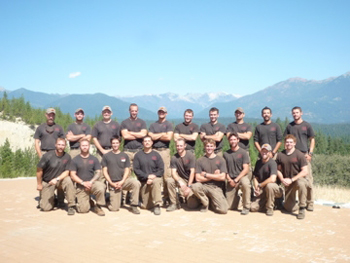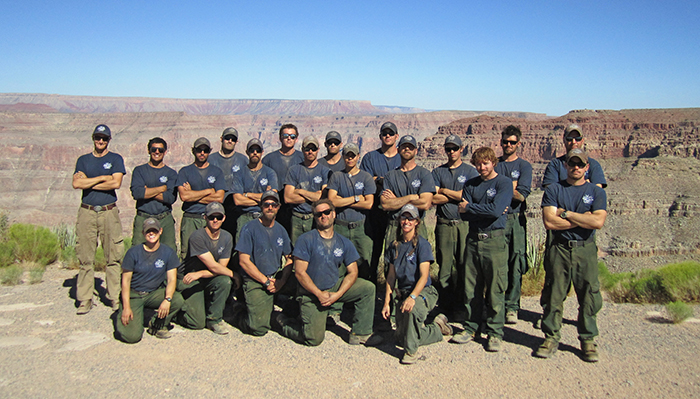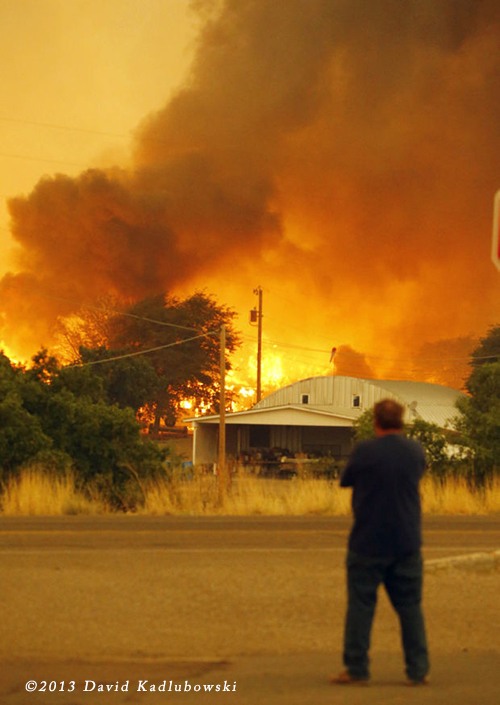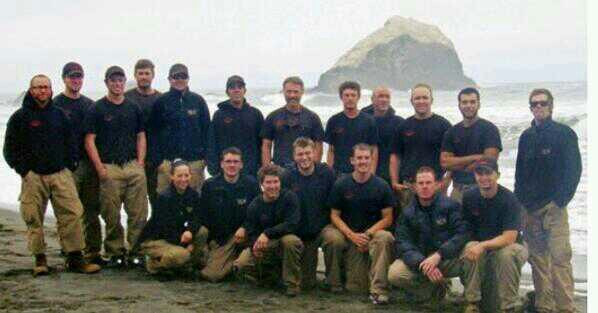News from Central Arizona surrounding the Yarnell Hill Fire:

Most recent Prescott Granite Mountain Hotshots. from the Prescott AZ city web site

2011 portrait of the Prescott Granite Mountain Hotshots. image from the USDA Forest Service
From azcentral.com:
Arizona State forestry officials confirmed Sunday night that 19 firefighters have died in the Yarnell Hill Fire that has ripped through half of the town, sent residents to Prescott for safety and given the state it’s biggest ever wildfire firefighter tragedy.
“It’s a dark day,” said Mike Reichling, Arizona State Forestry Division spokesman.
Reichling said the 19 firefighters were found in area that also had 19 fire shelters deployed. Some of those found were inside a shelter. Some where not.
Reichling expects about half of the town’s 500 homes to be decimated by the fire that is currently burning with zero containment and has grown well past 2,000 acres.
[…] the fire is quickly reaching “Type 1” status and that federal authorities will be brought in to help Monday morning. Reichling expects the manpower dedicated to the fire to reach about 400 people as federal help arrives.
Fire officials Sunday afternoon ordered the evacuation of Yarnell and parts of Peeples Valley as a fast moving, lightning-caused fire that charred up to 2,000 acres reached Yarnell, Reichling said, Arizona State Forestry Division spokesman.
The wind-whipped blaze also prompted officials to shut 25 miles of State Route 89 between Congress and Kirkland, but residents of the hundreds of evacuated homes could still travel the estimated 30 miles to a shelter in Prescott, Reichling said.
The Yarnell Hill Fire, ignited at about 5:30 p.m. Friday, was moving north and east at the rate of about half a mile per hour, fire officials said.
As about 250 firefighters fought to keep the blaze at bay Sunday, officials evacuated three subdivisions outside Yarnell, officials said.
The fire had reached Yarnell town limits but as of 5 p.m. no structures had been lost, Reichling said.
The Yarnell Hill Fire was zero-percent contained Sunday, officials said.
Fueled by chaparral and grass, the blaze was burning uphill on state land about 25 miles north of Wickenburg with 15-to 20-foot flames, he said.
The Yavapai County Sheriff’s Office evacuated the Double Bar A Ranch and Model Creek areas, officials said. A reverse 911 call was sent and sheriff’s deputies went door-to-door to alert residents.
The temperature warmed to 101 degrees Sunday afternoon and southwest winds were blowing up to 22 miles per hour, Reichling said.
The low humidity, type of fuel, topography and northwest direction of the wind was feeding the and pushing it up the hill toward the communities, Reichling said.
About 250 firefighters, including two Type 2 crews, three Type 1 crews, and four engines, were on the scene, Reichling said. Three Type 1 crews, seven helicopters, two air tankers, four single engine air tankers, and multiple engines and air tankers were ordered.
A total of 160 firefighters, including six hand crews, two helicopters dropping water, two engines, two single air tankers and a heavy air tanker, were battling the blaze, he said.
Staff writer Yvonne Wingett contributed to this report.
From the ArizonaDailyStar:
Prescott Fire Department confirmed 19 firefighters have died while battling the Yarnell Hill fire Sunday night, Fox 10 news is reporting.
They’re part of the Prescott Granite Mountain Hot Shots.
The wildfire was likely caused by a lightning strike Saturday night.
The Yarnell Hill fire, about 35 miles southwest of Prescott, has burned about 1,300 acres and forced the evacuation of 50 homes.
The fire started Friday and has not yet burned down any structures, but Sunday night firefighters pushed the blaze back away from communities, hoping to keep the blaze from overtaking any homes.
A growing fire in Yarnell forced about 600 residents from their homes.

wildfire
David Kadlubowski
Dean Smith watches as the Yarnell Hill Fire encroaches on his home in Glenn Ilah on Sunday, June 30, 2013 near Yarnell, Ariz. The fire started Friday and picked up momentum as the area experienced high temperatures, low humidity and windy conditions. It has forced the evacuation of residents in the Peeples Valley area and in the town of Yarnell. (AP Photo/The Arizona Republic, David Kadlubowski)
A gallery with several images is HERE.
USDA Forest Service website for Prescott Granite Mountain Hotshots
Welcome to the Prescott Hotshot Crew Web Page!
Since 1973 when the crew first received Type I status it has gone through many changes with equipment, technology, and training, however the overall job of a Hotshot has not changed. The Prescott Hotshots still remains as an elite, professional, and outstanding crew of Wildland Firefighters.
History
- The Prescott Hotshots originated in 1972 with the formation of a regular crew (Type II). George Pittman was the crew boss with a crew made up of Prescott College students.
- In 1973, Durk Lokes ran the crew and applied for and attained Type I Hotshot Crew status in July of that year.
- In 1975 the crew took on a new look with Mark Zumwalt at the helm. It was at this time that Mark brought with him new technology and crew structure from California and the crew became truly interregional.
- In 1977 the crew was 30 persons strong with three sections of ten each. Sections were rotated and fillers used off the other sections to assure a 20 person crew at all times.
- In 1978, Glenn Dundas took over control and changed the physical standards to what they are today. Glenn ran the crew for seven years and again structural changes were made with the five person overhead structure one superintendent, two foreman, and two working squad bosses.
- Tom Tobin assumed command in July of 1985. Physical standards remained the same as the integration of a diversified workforce began. That year new crew transportation was purchased which consisted of one chase truck and two nine passenger crew carriers (aka “buggies”). Due to an injury Tom was reassigned to dispatch in 1988.
- Tony Sciacca a seasoned member of the crew took command following Tom’s absence in 1988. In 1991 the crew moved from the Groom Creek Work center to the newly built Prescott Fire Center and Henry Y.H. Kim Aviation Center. Tony’s tour as Superintendent ended after the 1998 fire season and from there he moved on to be a District Fire Management Officer on the Prescott.
- Curtis Heaton who worked his way up through the ranks became Superintendent in 1999 where he remained until the end of the 2001 fire season. Curtis then moved on to the Fish and Wildlife Service as a Wildland Urban Interface Specialist before returning to the Prescott as the Forest Fire Management Officer in 2006. Curtis left the Prescott National Forest in 2008 to serve as the Operations Section Chief on the Phoenix based National Incident Management Organization (NIMO) Team.
- Jeff Andrews who also worked his way up through the ranks became Superintendent in 2002. Jeff is currently the Prescott National Forest Deputy Fire Staff Officer.
- Darin Fisher took over as Superintendent in 2005 and remains in the position today.

undated portrait of the Prescott Granite Mountain Hotshots
The Granite Mountain Hot Shots crew[is] part of the Wildland Fire Division of the Prescott Fire Department,
A feature article last year from cronkitenews.com on this crew can be found HERE.
Diving to the ground, crew members attempt to form a tight circle and point their feet toward the approaching flames. That will deflect heat and help protect their torsos. They clamp down on the edges of their emergency shelters to make sure fire, smoke and heat can’t get inside, and they keep their faces near the ground to breathe cooler air that won’t damage their lungs.
There’s nothing to do now but wait.
Members of the Granite Mountain Hotshots, one of 112 Interagency Hotshot Crews around the country, have never had to use shelters during a wildfire. But working in remote locations to get ahead of the most dangerous sections of fires makes knowing how to do so a matter of life and death.
Training is crucial, especially for the four rookies on the 22-member squad.
“If we’re not actually doing it, we’re thinking and planning about it,” said Eric Marsh, superintendent of the Granite Mountain Hotshots.
“When we get out there, it’s a completely different ballgame,” said Daniel McCarty, another squad leader. “It’s the real deal. We have to look out for each other.”
The crew, one of 13 hotshot teams in Arizona, has eight full-time members. The rest work from April until September.
Being on a hotshot crew means one is on call throughout fire season, staying close enough to head out on short notice.
Fire duty can mean staying in the forest rather than returning to base camp for the night. Members of the Granite Mountain Hotshots sometimes have to spend up to two straight weeks in the wilderness, getting supplies by helicopter.
Last year, the Granite Mountain Hotshots fought some of the biggest fires in Arizona — Wallow, Horseshoe Two and Monument – as well as blazes in states such as Colorado, New Mexico and Minnesota.
Having to operate in the wilderness with little support, training is a way of life. On a recent weekday, preparing for fire season, members of the Granite Mountain Hotshots practiced setting up fire shelters as well as cutting fire lines.
But better to have mistakes happen here, where training can correct them, than in a real fire.
“In any other job you don’t have to worry about your life day in and day out,” said McCarty, the squad leader. “But in this job you have to watch your buddy too.”





























